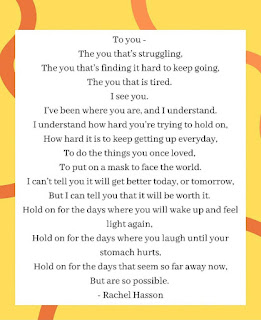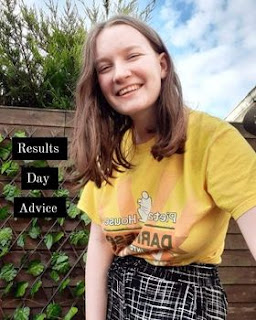What is anxiety?
For this topic, I
will be speaking mainly from my own personal experience as I am diagnosed with
generalised anxiety disorder. However, to make things clearer I will refer to
the definition. The word anxiety itself
is defined: “a feeling of worry, nervousness, or unease about something with an
uncertain outcome.” I want to make it clear, that anyone can experience
feelings of anxiety, but not everyone has an anxiety disorder. Feelings of
anxiety around big life events are normal, for example. However, if you find
that your anxiety is hugely impacting your life, that’s when you should
consider reaching out for help.
Panic attacks
For many one of
the most prominent features of anxiety is panic attacks. You may have also
heard of the term anxiety attacks. A person with anxiety may experience, one of
these, both or none, and all of their experiences as equally valid.
When we think of
anxiety, we typically think of the brain, because of course it is a mental
health problem. But what we also need to recognise is the physical impact that
anxiety can have.
Harmful statements
such as “it’s all in your head” do not help people with anxiety. It causes
physical symptoms, and these are not any less valid because they are caused by
your mental health rather than physical.
Some physical
symptoms of anxiety include: Heart Palpitations
Pounding heart
Excessive Sweating
/ Perspiration
Uncontrollable
Trembling / Shaking
Shortness of
Breath
Choking Sensations
/ Difficulty Swallowing
Nausea / Vomiting
Dizziness /
Lightheadedness
Hot and Cold
Flashes
Not everyone will
experience all of these symptoms, everyone has different experiences with
anxiety and every individual experience should be validated.
Some things you
can do to help your anxiety
·
Reach out
to your local doctor – I always say that this is the first step when it comes
to mental health. Typically, your GP will know you well and will be able to
make a decision on what advice/help will benefit you.
·
Counselling/Therapy
– from personal experience this helped me to better understand my anxiety and
helped me to develop coping mechanisms.
·
Recognise
triggers – try and recognise what triggers anxiety for you. Once you do this
you can take steps to avoid certain situations if possible, and to make the
people around you aware so that they can support you.
·
Routine
– having a routine and setting small daily goals can help to make anxiety more
manageable. Having a good routine will also help with your sleep.
·
Mindfulness
– anything like meditation, yoga, breathing exercises, reflecting, is a good
way to cope with anxiety.
·
Sensory
toys – having things like this can help with sensory overload!
Things you
should know if you have anxiety
- You are
strong
- Your
struggles are valid
- You will
get to a better place
- It’s
okay to have bad days
- With hard
work you can learn to cope better
Where else can you find me?
- You can also find me here;
- Instagram: @yourbest_isenough
- @rachswrites
- Twitter: @rachelhasson4
- TikTok: @yourbest_isenough
- Depop: @rachelhassonx
- Goodreads: www.goodreads.com/rachsreads








